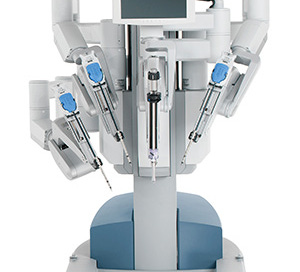Subscribe to the STEMScribe newsletter to gain full access to our materials. It’s free!
“Life is short, Art is long,” is the beginning of Hippocrates’ First Aphorism.1 This phrase reflects the fact that human life is brief in comparison to the endless skills to be explored beyond one’s lifetime, yet their ever-evolving art lives eternally.2 Hippocrates could never have imagined the motorized machines used in modern healthcare, let alone the countless robots and artificial intelligence (AI) that have been melded into medicine worldwide.
The Da Vinci surgical robot is now an integral tool in the surgical field and crucial to minimally invasive surgeries, boasting over 10 million procedures. Its three to four arms offer a range of intricate and meticulous movements that according to the system’s developer are “beyond the limits of the human hand.”34 The demand for high-tech surgical robots has only continued to rise, with companies such as Vicarious Surgical and Neuralink entering the market, Vicarious being financially backed by major revolutionizers in technology Bill Gates and Vinod Khosla.5
All these technologies require a trained surgeon to operate them behind the scenes, reinforcing professionals' confidence in the security of their positions. Yet, with the advancement of technology, how long until these dependent machines become entirely autonomous? The question inevitably arises. Can these machines someday single-handedly dominate the surgical field, eradicating human practitioners?
Although the precision of robots may be well beyond the reach of the human hand, the techniques are only half the art of medicine. The other half calls upon the genuine empathy and compassion of medical professionals, and their abilities to apply well-known knowledge to patients, carefully considering individual circumstances and mentalities.6 The truth is, no one wants to be greeted by a cold, metallic hand before life-changing surgeries, or cry to a sterilized apparatus after being diagnosed with cancer. Surgery isn’t just a series of procedures ended when the last stitch is placed. It exists beyond the operating table, with layers of communication and trust put into building a patient-physician relationship, something a robot can never emulate.
In a study conducted in 2019, over 200 participants were offered free assessment of their stress level, with 40% of participants signing up when informed they would be assessed by a doctor, and only 26% accepting when told a computer would assess them. The researchers found that patients valued their individuality and believed that a standardized computer could not meet their unique needs.7
Robots promise cutting edge solutions, but they lack something only surgeons possess; the human brain. Human beings can adapt standard procedures to suit unforeseen circumstances such as declining heart rates or a cease in breathing. Robots programmed to carry out master surgical plans cannot circumvent these outliers, nor can they mimic the empathy surgeons possess.
Returning to Hippocrates’ Aphorism, originally written in Greek, the word art has been translated from the word “techne”, the now root of technology.8 This gives a new interpretation of the phrase; “technology is long.” The revived Hippocrates would recognize that these robots are invaluable in surgery and overall healthcare.
Conclusively, the true solution is not to completely replace surgeons with robots, but to augment them into surgeons’ current work, elevating the capabilities of the human hand. Robots can transform the art of medicine, but they can never paint over the humanistic nature that makes it an art.
Bibliography
1) Albert R. Jonsen. “ Life is Short, Medicine is Long”: Reflections on a Bioethical Insight Journal of Medicine and Philosophy (2006) 31:6
2) Deepa Kaushik. “Ars longa, Vita brevis - a debatable phrase” CareerRide (2015) https://www.careerride.com/view/ars-longa-vita-brevis-a-debatable-phrase-24542
3) George A. Antoniou, MD, PhD, Stavros A. Antoniou, MD, George S. Georgiadis, MD, and Athanasios I. Antoniou, PhD, “A contemporary perspective of the first aphorism of Hippocrates.” Journal of Vascular Surgery 56:3 (2012): 867
4) Hippocrates. 1962. The Arch, Works of Hippocrates Vol. IV, 95–98. Cambridge, MA: Harvard University. W. H. S. Jones (trans.) (1962)
5) Intuitive “Da Vinci Instruments” (2023)
dahttps://www.intuitive.com/en-us/products-and-services/da-vinci/instruments
6) Intuitive “Robot-Assisted Surgery with da Vinci Systems” (2023)
https://www.intuitive.com/en-us/patients/da-vinci-robotic-surgery
7) Longoni, Chiara and Morewedge, Carey K. , “AI Can Outperform Doctors. So Why Don’t Patients Trust It?’ (2019)
https://hbr.org/2019/10/ai-can-outperform-doctors-so-why-dont-patients-trust-it
8) Ranjana Srivastava. “ Will robots make doctors obsolete? Nothing could be further from the truth” (2020)
https://www.theguardian.com/commentisfree/2020/jan/22/will-robots-make-doctors-obsolete-not hing-could-be-further-from-the-truth
9) Robert Glatter, Peter Papadakos and Yash Shah, “ No AI Can Learn the Art of Medicine” (2023) https://time.com/6306922/artificial-intelligence-medicine-doctors/
10) Sai Balasubramanian, M.D., J.D. “Can Doctors Truly Be Replaced By Technology?” Forbes (2021)
https://www.forbes.com/sites/saibala/2021/09/22/can-doctors-truly-be-replaced-by-technology/?s h=5af857364a83
Hippocrates. 1962. The Arch, Works of Hippocrates Vol. IV, 95–98. Cambridge, MA: Harvard University. W. H. S. Jones (trans.) (1962)
Deepa Kaushik. “Ars longa, Vita brevis - a debatable phrase” CareerRide (2015) https://www.careerride.com/view/ars-longa-vita-brevis-a-debatable-phrase-24542.aspx
Intuitive “Robot-Assisted Surgery with da Vinci Systems” (2023) https://www.intuitive.com/en-us/patients/da-vinci-robotic-surgery
Intuitive “Da Vinci Instruments” (2023) https://www.intuitive.com/en-us/products-and-services/da-vinci/instruments
Sai Balasubramanian, M.D., J.D. “Can Doctors Truly Be Replaced By Technology?” Forbes (2021) https://www.forbes.com/sites/saibala/2021/09/22/can-doctors-truly-be-replaced-by-technology/?sh=5af857364a83
Sharon Bahrych, PA-C, MPHI. “What happened to the art of medicine?” KevinMD (2011) https://www.kevinmd.com/2011/11/happened-art-medicine.html
Chiara Longoni and Carey K. Morewedge , “AI Can Outperform Doctors. So Why Don’t Patients Trust It?’ (2019) https://hbr.org/2019/10/ai-can-outperform-doctors-so-why-dont-patients-trust-it
George A. Antoniou, MD, PhD, Stavros A. Antoniou, MD, George S. Georgiadis, MD, and Athanasios I. Antoniou, PhD, “A contemporary perspective of the first aphorism of Hippocrates.” Journal of Vascular Surgery 56:3 (2012): 867
Written by Shreya Malepati
The STEMScribe blog is a reader-supported publication. Subscribe to show your support. It’s free!
If you would like to submit a guest post to the blog, please fill out this form. Join the Discord server to gain access to our free tutoring and mentorship services.



